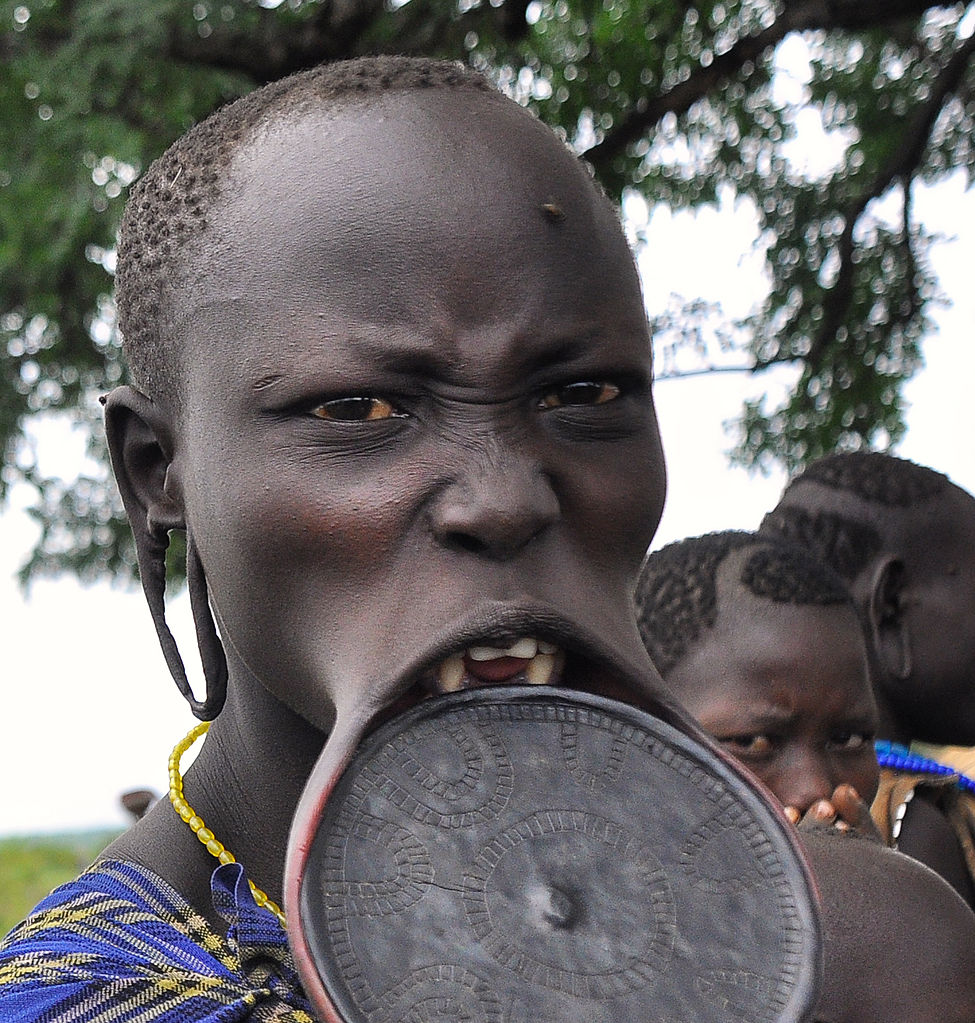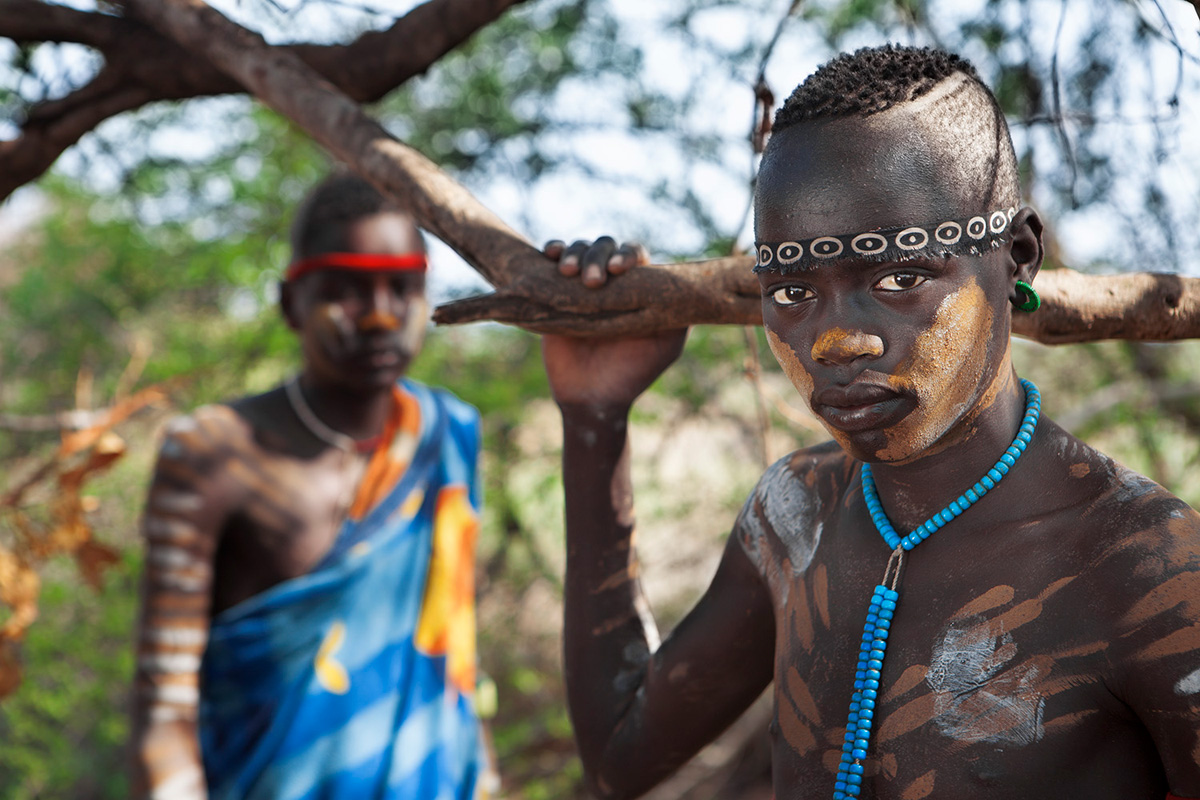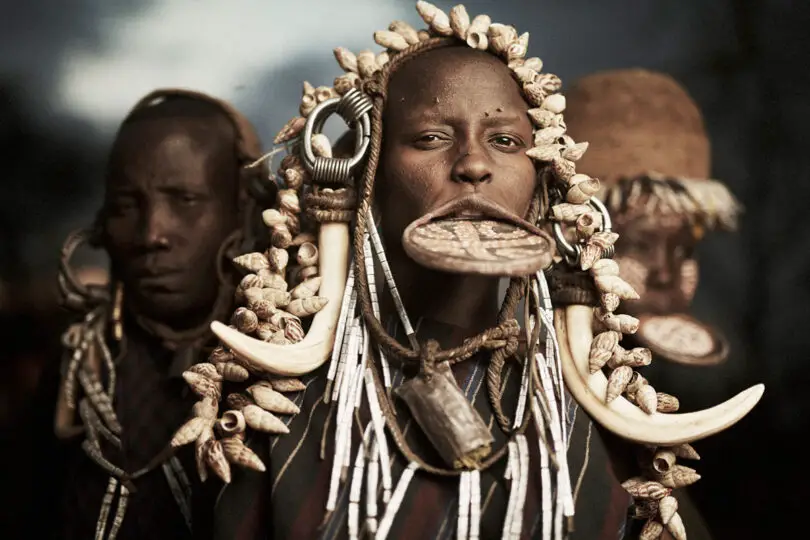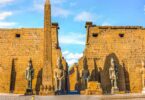For decades now, Ethiopia has held onto traditions that intrigue the world especially Mursi women who gauge their lips with miniature plates. What’s more intriguing is this; why is the Mursi tribe dangerous? The Mursi people are an indigenous tribe living in Ethiopia’s Southwest region bordering Kenya and South Sudan. They are among the bonafide inhabitants of Omo Valley, Ethiopia’s hotbed of centuries-old culture. As nomads, they move around a lot in search of pasture and water. However, their social and economic undertaking projects them as people to fear.
Table of Contents
Why Do Mursi People Of Ethiopia Wear Lip Plate?
Mursi women wear a lip plate as a sign of marriage eligibility and the ability to sire children. Thus, women of childbearing age will always have a lip plate gauged on their lower lip. Although there are less than 10,000 in the total population, the men from this tribe marry within and continue their generation.

Mursi Tribe Ethiopia. Photo/Wikimedia.
Regarding lip plating; it’s part of the basis for why is the Mursi tribe dangerous. A lip-plated woman has her lower lip cut to fit the plate and the aftermath of this is a change of perception. They appear to be intimidating unless you understand the cultural significance of it all.
What Does the Mursi Tribe Eat?
As pastoralists living in a semiarid part of Ethiopia, you would be forgiven to think that their main diet is meat. However, they mostly survive on corn and sorghum porridge mixed with blood and milk. Nomadic tribes in Africa always get fresh blood from cows and goats without killing them. What’s surprising is that they only eat meat occasionally in times of severe drought or a celebration.
Why is the Mursi Tribe Dangerous?
If you always wonder why is the Mursi tribe dangerous, the following reasons explain it all.
Genetic Makeup
Their tall and slender stature with a reputation for aggression. Mursi tribe’s genetic makeup further bolstered by their diet gives them a slender and aggressive look.
Remote Living
Further, living deep in Ethiopia’s southwestern wilderness makes their survival hard as pastoralists. There are cases of tribal clashes at Omo Valley mostly resulting from pasture and watering points.
Limited Exposure
Until recently, the Mursi tribe had little contact with other cultures. Misunderstandings and miscommunications happen at times and with their little exposure to the real world, conflict is inevitable.
Invasion of Privacy
Due to Mursi tribe’s distinctive practises and aesthetic, they have gained popularity among tourists. However, the increase in tourists occasionally results in exploitation, cultural misunderstandings, and disputes. Tourists have occasionally described feeling frightened or encountering hostile behaviour which expounds why is the Mursi tribe dangerous.
The trip to the Mursi is challenging. You fly to Addis Ababa first and take another local flight to two remote villages in the south where the journey begins. You then have a six to eight-hour drive to the deep interior where the Mursi people live. It’s a treacherous drive because roads are in a very poor state especially during or immediately after a rainy season.
Why Do Mursi Drink Blood?
Fresh cow and goat blood trigger questions about why is the Mursi tribe dangerous. But, it is a part of their diet; blood and milk and sorghum porridge. Consuming cow blood gives them the energy to look for pasture or warriors heading out for war. It gives them strength and stamina during fights.

Men from Ethiopia’s Mursi Tribe. Photo/Atlas of Humanity
In addition, to serving as a nutritional source, blood has a spiritual significance. This tribe relates blood to vitality, procreation, and the health of its society. Further, blood drinking is associated with tribal rites of passage, ceremonies, and rituals. Many of the tribe’s members regard it as an essential component of their customs and a part of their cultural identity.
These ceremonies commemorate important events like reaching a certain age, becoming an adult, or being ready for battle.
Does Mursi Tribe Believe In God?
The Mursi people have an ultimate deity or creator that they refer to as “Tumwi.” The sky and the heavenly realms are connected to Tumwi, which they view as the ultimate source of strength.
They hold that Tumwi is in charge of maintaining the universe’s equilibrium and order because she created it. Their customary animist beliefs are grounded on the idea that spirits inhabit natural things and phenomena. As such, they have a deeper appreciation for nature and adoration of ancestors’ spirits.








